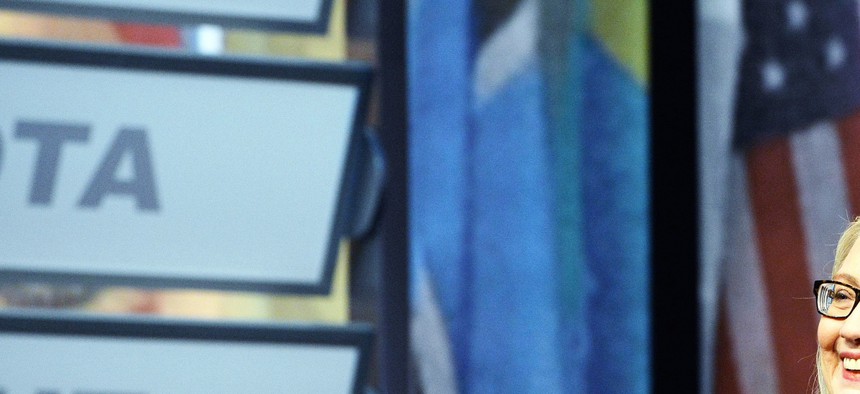
State Department file photo
Bush, Clinton and the Fatigue Factor
Party elites may be fine with dynasty candidates, but rank-and-file voters are warier.
There are some surprising events that warrant being taken very seriously; others, well, not so much. Prior to Thanksgiving, it looked pretty unlikely that former Florida Gov. Jeb Bush would actually pull the trigger and seek the 2016 Republican presidential nomination, even though it was obvious that he personally wanted to do it. Since then, things have changed dramatically, to the point that it is now essentially a done deal. It makes you wonder what transpired in the Bush household over turkey, dressing, and cranberries.
Bush's entry is an unexpected event with huge consequences, whether he ultimately wins the GOP nomination or not. He represents the most formidable fundraising network in the party, has candidate skills that are probably better than those of anyone else in the party, and was a highly successful governor of a big-time state, one that is of great significance both in terms of the GOP nomination and the general election. Many others show potential. Jeb Bush's bona fides are more concrete.
On the other hand, 2012 Republican nominee Mitt Romney's disclosure that he wants to run is a bit harder to take seriously. In fact, it takes considerable effort not to see Romney's words as anything but a pathetic attempt to stay relevant, a reaction to being all but ignored as those few in the Republican establishment who aren't enthusiastic for Bush instead push for New Jersey Gov. Chris Christie. The fact is that if the 2012 GOP field were stronger, Romney probably wouldn't have been the nominee. The center-right/establishment half of the Republican NCAA-like bracket gets pretty much filled by Bush and, even more so, by Christie, if in fact there is room for two.
Bush's challenges, and for that matter those of Hillary Clinton, were dramatically on display in an Aurora, Colo., focus group of 12 voters conducted last week by renowned Democratic pollster Peter Hart. The gathering was part of a 10-year-old series Hart has conducted for the Annenberg Public Policy Center of the University of Pennsylvania. While a focus group of just a dozen voters is hardly a cross section of the entire electorate, this kind of qualitative research provides a color and texture that is simply not available through normal quantitative polling that surveys hundreds or thousands of voters. By examining average Americans' actual words, voices, facial expressions, and body language, the "why" becomes more clear. The numbers just give you the "what."
Having sat behind the glass during many of these groups and watched a video live-streaming of this one, I know that Hart is a master at getting voters to open up about their views of their lives and personal struggles, as well as their perceptions of the economy, the country, political issues, and specific politicians. The pushback from Thursday night's focus group would be jarring to anyone who assumed that the nominations of Bush and Clinton are inevitable. When half a dozen voters in a conversation say they would back a law that would ban any Bush or Clinton from running, it makes you sit up and take notice.
When participants were asked to associate words or phrases with Clinton, some were positive, describing her as "strong" and a "spitfire" and just "I like her." Some were mixed—"politician, but gets things done"—but many more offerings were pejorative: One reference was to "Benghazi," and others included "crazy," "I don't like her," "more of the same," "next candidate, please," and "untrustworthy." For Bush, the positives were "intriguing" and "interesting," but like with Clinton, the negatives were far more numerous: "again?" "bad seed," "clown," "don't need him," "greedy," "joke," "no thank you," "scion," and "a wannabe."
Some of these are simply manifestations of the oft-discussed "dynasty" issue, the view that in a country of over 300 million people, aren't there qualified people from more than just two families that would be worthy of electing as our president? The retort is obviously that just because Bill Clinton served as president for eight years and Jeb Bush's father and brother served for a total of 12, can no other member of their families even be considered, no matter what their qualifications and attributes? But when people make the dynasty argument, it's unclear how much of that is a real, specific objection and how much is a roundabout way of saying they don't like this Bush and/or this Clinton personally. Some of the words and phrases seem awfully targeted beyond simply the concept of legacy candidacies.
For Bush, the unusually high negative ratings he scores in the polls, the focus-group reaction, and other anecdotal evidence suggest that he is like the guy whose older brother banged up the family car. Jeb Bush is being perceived more as part of a brand that was badly damaged by his brother and less by anything specifically related to him. How closely did critics watch his time as governor, and are they actually familiar with own political positions? This looks more like guilt by association than anything else; maybe voters will end up liking and agreeing with him, maybe they won't, but it doesn't look like he is being judged on his own terms. To succeed with rank-and-file voters—first Republicans, and later all general-election voters—he has to rebrand himself so that he will be perceived independently of his brother. Republican elites of the Wall Street, Fortune 500-executive, and GOP donor classes get the distinction, but it appears to be lost on nonelites. Bush starts off with a lot of big advantages over the rest of the field but he has a major image challenge that no other Republican has to face.






